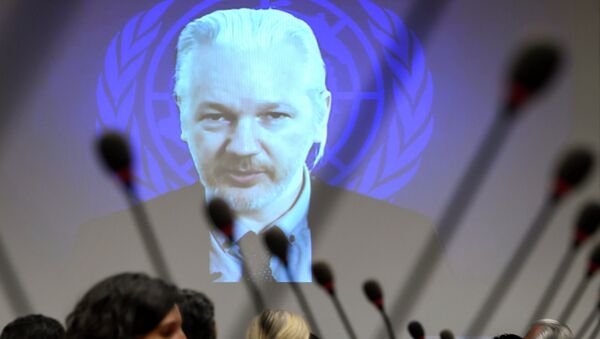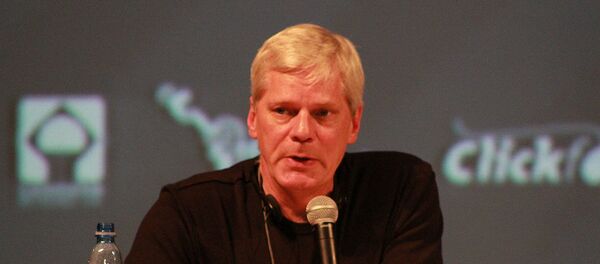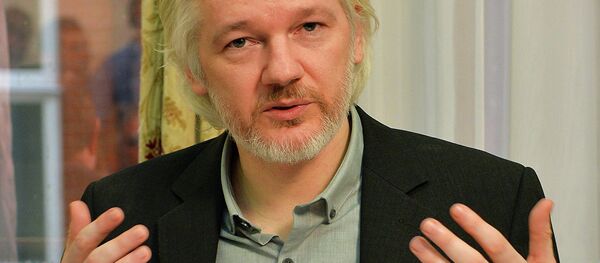Katya Lakshina — He appears on a big screen like a virtual deity before his worshippers. He sits against a purple, almost papal, background, totally devoid of anything identifiable, in a pink check shirt and looks downhome and composed at the same time. With his beard and long shoulder-length albino hair pushed away from the forehead Assange could easily pass for a 'Narodnik', a Russian revolutionary of the 1870s.
His perceived ambiguity is acknowledged straight away in the introduction made by Baroness Beeban Kidron: "He is accused of betraying secrets of nations, but for other people he exposed the truth of nations…He is accused of serious crime in Sweden but as his team is at pains to point out, he's yet to be charged in any country. And he is accused of being capricious and paranoid which, I have to say, is unappealing, but to my knowledge not yet a crime'.
Before delving into the Q&A session Baroness Kidron reminisces that, while working on her documentary InRealLife, she became more and more interested in data, i.e. who knows what about people, and met Julian Assange at his current refuge in the Ecuadorian embassy. She admitted that some of what he had said seemed far-fetched but by the time InRealLife hit the cinemas the Edward Snowden story broke out, and 'almost every far-fetched and paranoid thing Julian had said were confirmed by Snowden's revelation'.
The actual question put to Assange is a 'boil-down' of dozens of questions sent by the audience before the talk. ‘How do you square your desire for openness with the individual need for privacy' is one of them.
'This question was to be defined in Berlin in the late days of the Cold War in the 1980s which is: that there should be transparency of governments and that there should be privacy for individuals, more or less.' — comes the answer.
He feels the autonomy of the individual is starting to dissolve in a larger system where there is no privacy, and this is the duality of transparency and privacy.
'It's really about power and power is also about autonomy for individuals", Assange tells us.
With power comes the subject of policing: does everything need policing in the Internet?
'I would say, philosophically, no if we are talking about human oriented systems but what is done to people needs to be policed'.
It's no secret there is a lot of bad people and some of them happen to be in government too, that is why powerful corporations (which are now a form of government) and powerful institutions, like the secret services, do need to be policed.
He introduces us to the notion of 'critical mass phenomena' pointing out that sometimes 'a system somehow turns into its own thing'.
'The system that is developing is fascinating: everything is becoming more itself once it has a certain organisational mass: Scotland is becoming more Scotland, for example, GCHQ becomes more GCHQ, the Tories are becoming more Tories, but I think Labour probably are not becoming more Labour (laughter)…'
The Wikileaks founder reminds us that nearly all security agencies are run as businesses, nearly 80 percent of the US National Security Agency's budget goes to private contractors, like the one Edward Snowden worked for.
To illustrate the fine line between governments and corporations, Julian Assange informs the audience of a meeting between Michael Lynton, the CEO of Sony Entertainment, and PM David Cameron that happened shortly before the Scottish independence referendum.
'The bargaining point was whether Sony would air first Scottish TV series called 'Outlander'. And the outcome of the meeting was that the series was delayed until after the referendum and even then it was not broadcast on any major channel', — says Assange.
Which, yet again, might be a great tool too, so what advice can he give to people who want to change the world through technology and transparency in 2015?
Being a mathematician he points to a 'geometric phenomenon', as he calls it: small things you do now may make a big change later. But it may make no change at all.
This public lecture lasts only an hour and the final question comes in the spirit of the Russian 'Narodniki': has imprisonment changed his view of life, and it does not take long for him to answer:
'When you are in this situation for a long period of time and it does not change, than you become more strategic in your thinking and start looking more at long-term plans rather than short-term plans. Anyone who is in the position of being detained in one form or another runs the risk that they start to think too much about themselves and the interaction with their immediate environment. I am fortunate that I have an organisation that is involved in a dozen legal court-cases, in the past month we have published thousands of documents. This gives me the ability to look outside of my immediate confines which is helpful to me'.
With these words he disappears from the screen, and we are left puzzled about whether that was a 'yes' or a 'no' and had he also envisaged this turn of events for himself.





